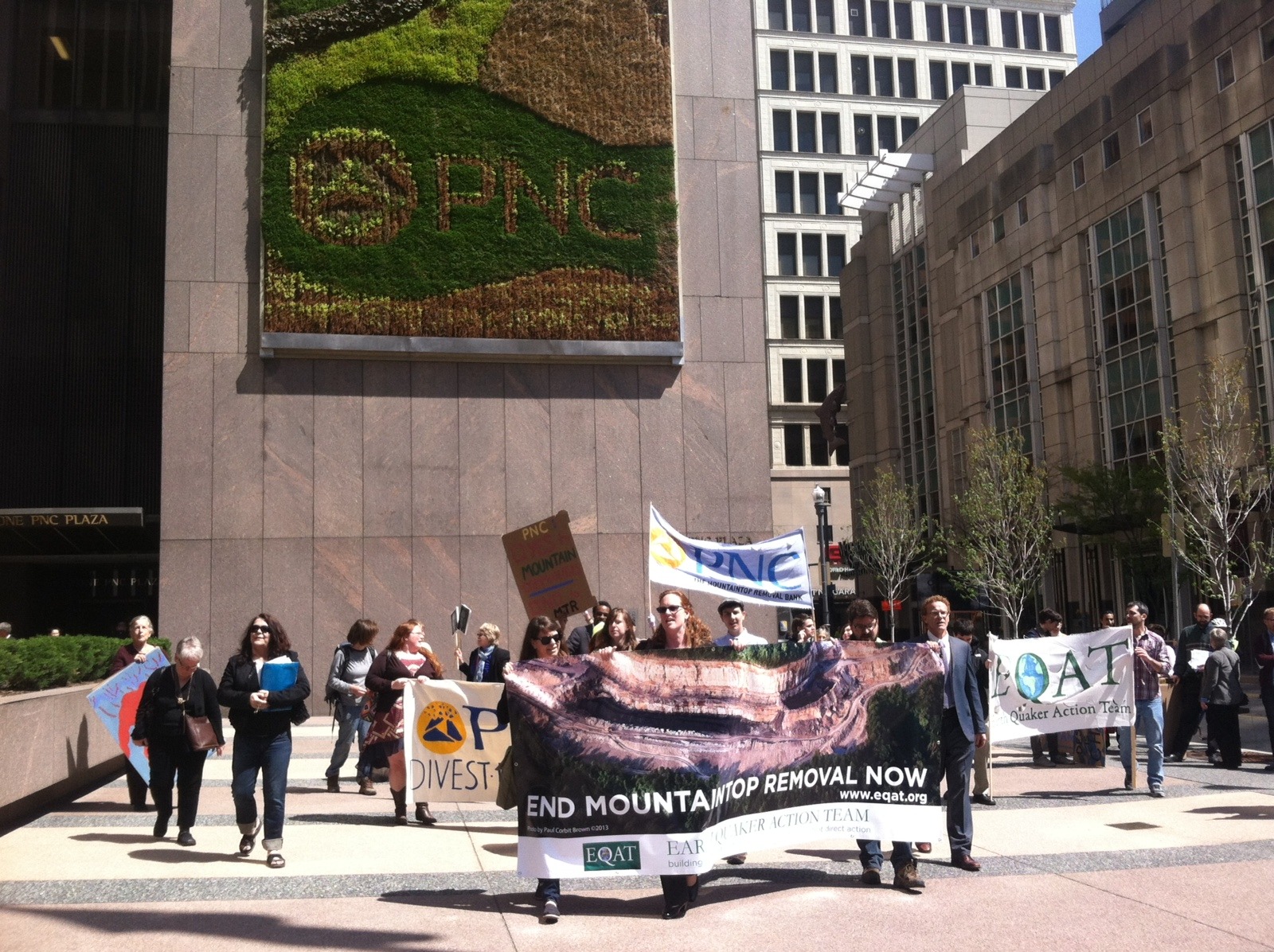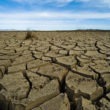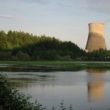Pittsburgh
On a Monday morning a month ago, I was sitting on the marble floor of the Squirrel Hill branch of PNC Bank, with a circle of activists protesting PNC’s financing of mountain-top removal (MTR) coal mining across Appalachia. MTR causes increased cancer rates and birth defects as well as massive environmental degradation—not to mention the carbon dioxide emissions and global warming generated by burning the mined coal. This was one of 16 bank occupations organized by the Earth Quaker Action Team (EQAT) to coincide with a gathering that drew thousands of climate activists to the city for a weekend of trainings and actions.
Our small group included a young family, Nick and Rustina, and their two children, who spoke tearfully of how their home-place in Clintwood, Virginia, had been ruined by MTR. The mountain where generations of their coal-mining family had hiked and hunted was razed, the stream where the kids had fished and played now ran orange, and drinking water to their home and the municipal supply was contaminated. They had moved to Berea, Kentucky, to go back to school and try for a fresh start. Their story was just one small instance of how the business of what Bill McKibbon refers to as “rogue” energy corporations disproportionately affects working-class and poor people in the U.S. Other examples would include urban children’s asthma rates, chemical dumping in poor neighborhoods, nuclear waste on native lands—and the list goes on.
A class perspective recognizes that there are real enemies in this fight, and they are in many ways the old class enemies: the operators of global capitalism.
A class-conscious response
Let’s look at the scope of what Stephen Emmott calls “the unprecedented planetary emergency we have created.” (I’ll question this culpable “we” below.) According to the New York Times, concludes that “babies being born now could live to see the early stages of a global calamity.” Adults are witnessing this already in many parts of the world—floods, droughts, fires, tsunamis, hurricanes, lethal heat waves, ice-melts, species extinctions—all attributable to global warming. Typhoon Haiyan is the latest example, as Yeb Sano, Philippine delegate to the current U.N. climate convention in Poland made clear, imploring the group to “stop this climate madness.”
These climate events may be exacerbating the social and political crises we also see: famine, migrations, epidemics, civil wars, land-grabs, and the ratcheting up of security apparatus to protect those whose economic activity is doing the damage. Combine these climate crises with a burgeoning global population—10 billion by mid-century, according to Emmott—and we seem to be moving towards a full-blown climate collapse, which will, of course, bring with it economic and political catastrophes of unseen magnitude.
If that is the case—that is, if the calamity we face is global, affecting all of humanity and all other species—what does class have to do with it? We’re all in the same boat, aren’t we, on a rapidly rising ocean? Well, put simply, it has to do with who’s steering the boat we’re all in and who’s in line to be thrown overboard. A class perspective highlights how the consequences of global warming, like everything else under capitalism, are unequally distributed, with poorer populations around the world hit first and hardest.
Countries most likely to suffer the devastating effects of a overheating earth and rising seas by 2025 include Bangladesh, Guinea-Bassau, Sierra Leone, and Haiti—countries which have little or no responsibility for creating the crisis. Meanwhile, in the Amazon basin, rain forests are being razed and indigenous people removed to create arable land needed to grow soybeans to feed cattle to produce beef to satisfy the now-globalized appetite for hamburgers and thereby enrich the holding companies that own Burger King and other chains.
Typhoon Haiyan made “climate injustice” a major focus of the U.N. Climate Framework Convention in Warsaw. But of course, the effects of climate crises also spread to the developed world and wealthier populations. This summer’s fires in California burned national parkland and high-end mountain homes. Superstorm Sandy shocked the affluent out of the illusion of safety. The most opulent real estate in Miami Beach will be claimed by seawater by mid-century.
A class perspective, however, allows us to question the “we” Emmott blames for our unprecedented planetary emergency. If by “we” he means his readers—economically secure in the developed world—then we are implicated by our inequitable and unsustainable level of consumption and pollution, and we have a collective responsibility to take action.
But even “we” relatively affluent Westerners are not the designers of this crisis, and we’re not the ones profiteering on it. A class perspective recognizes that there are real enemies in this fight, and they are in many ways the old class enemies: the operators of global capitalism.
So this is an issue of the interests of the 99 percent versus the 1 percent—our new class vocabulary, which implies an alliance of poor, working, and middle classes against that enemy—if ever there was one.
It’s a struggle for fundamental justice—economic, social, environmental—and as such it needs to be fought with all the weapons of organized resistance we’ve brought to such struggles in the past, and more: legal action, political pressure, marches, occupations, media campaigns, direct action, financial divestment, blockades—the works.
And it is indeed being fought with increasing intensity by activists of all stripes, from pacifist Quakers in the U.S. to those on the front lines of environmental destruction around the world.
Do the radical thing
I’m pleased to report that so far $3.3 million has been withdrawn as a part of EQAT’s “Move Your Money” campaign. A drop in the bucket, perhaps, but I hope a noticeable one. The police who escorted us from the bank seemed to understand. They took our fliers and shook our hands. Other EQAT activists who had prepared for civil disobedience were arrested and the branch they occupied was closed. They succeeded in disrupting business as usual.
Calls for environmental justice can and should be calls for class solidarity. That’s neither obvious nor easy to act on. There’s a history of classism within the Green movement and there has been a conflict between the perceived interests of labor and environmentalists. Such conflict is now being addressed by groups like the Sierra Club and the BlueGreen Alliance.
And we have many other examples of cross-class organizing and histories of international solidarity to draw upon. Naomi Klein, whose forthcoming book will address climate change and the growing grassroots resistance, cites Canada’s Idle No More and other indigenous peoples’ movements as sources of hope. Stephen Emmott, however, isn’t holding his breath.
“We urgently need to do—and I mean actually do—something radical to avert a global catastrophe,” Emmott wrote in his clarifying book Ten Billion. “But I don’t think we will.”
Let’s do that radical thing and prove him wrong.
Nick Coles is an associate professor of English at the University of Pittsburgh. He writes for Working-Class Perspectives: Commentary on Working-Class Culture, Education, and Politics, where this originally appeared.





0 Comments